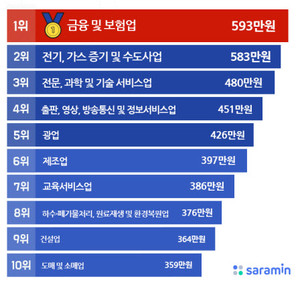–
Among the 18 major industries in Korea last year, the industry with the highest monthly wage was identified as the’finance and insurance industry’, which received an average monthly wage of 5.93 million won.
This is the result of analyzing ‘2019 industry, education, age group, gender wage and working conditions’ of the National Statistics Portal (KOSIS) on the 14th.
Second place was the electricity, gas, steam and water business (583 million won). In 2017 and 2018, the’electricity, gas, steam and water business’ had the highest monthly wage among 18 industries, but last year it gave the’finance and insurance industry’ the first place.
Next, professional, science and technology service (4.8 million won), publishing, video, broadcasting and communication and information service (4,45 million won), mining (4.2 million won), manufacturing (3.97 million won), educational service (3.68 million won), sewage and waste disposal , Material recycling and environmental restoration (3.76 million won), construction (3.64 million won), and wholesale and retail (3.59 million won).
Among the 18 major industries, the lowest total monthly wage was’lodging and restaurant business’ (2.34 million won), and the gap with the’finance and insurance industry’, which has the highest amount, was about 2.5 times.
In addition, industries with an average monthly wage of less than 3 million won included health and social welfare services (287 million won), associations and organizations, repair and other personal services (284 million won), and real estate and rental (276 million won). There were a total of 4 industries with monthly wages of less than 3 million won, two less than in 2018 (6).
The average monthly wage also differed according to gender. The total monthly wage of the entire industrial group was 4.28 million won for’male’, which was 1.45 million won higher than that of’female’ (28.38 million won).
Industries with a large gender gap are finance and insurance (2 million won), health and social welfare service (1.9 million won), educational service (1.88 million won), specialty, science and technology service (1.7 million won), electricity, gas, steam and water. It was identified in the order of business (1.7 million won).
In the case of the average years of service of workers in 18 major industries, the electricity, gas, steam, and water businesses were the longest at 13.6 years.
Subsequently, finance and insurance (11.6), education service (8.6 years), mining (8.6 years), transportation (8.2 years), agriculture, forestry and fishery (8.2 years), manufacturing (7.7 years), sewage/waste treatment, raw material recycling And environmental restoration industry (7.1 years), professional, scientific and technical service industry (6.9 years), and publishing, video, broadcasting and communication and information service industry (6.6 years) were in the top 10.
In addition, there were differences in the number of years of service according to gender.
First of all, the average years of service for men in the entire industrial group was 7.7 years, but for women, 5.1 years, 2.6 years longer for men than for women.
For men, △Electricity, gas, steam and water business (14.3 years) △ Finance and insurance business (12.9 years) △ Education service business (11.3 years) △ Mining industry (8.7 years) △ Transportation industry (8.5 years) △ Agriculture, forestry and fishery (8.5 years) Years) and so on. Women were in the order of △financial and insurance (10.2 years) △electricity, gas, steam and water business (9.5 years) △mining (7.6 years) △agriculture, forestry and fishery (7.1 years) △transportation (6.5 years).
–

